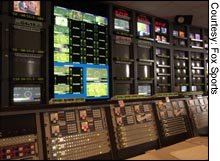 |
| Fox is broadcasting a high definition version of the Super Bowl, but many HDTV owners will be locked out from watching it due to a fight between station owners and cable operators. |
|
|
|
|
|
|
|
NEW YORK (CNN/Money) -
Thousands of fans who recently bought high definition televisions in anticipation of hosting a great Super Bowl party are about to tune into a low definition disappointment.
Even though Fox is broadcasting the game in HDTV format, the signal won't be available in many markets. So sports fans who spent thousands on new sets because of the extra sharp HDTV picture won't be getting their money's worth.
This nasty surprise may be particularly harsh for Philadelphia Eagles fans who live in such markets as Baltimore and Pittsburgh, or the New England Patriots fans in Rhode Island.
These fans are caught in a battle between owners of many of the individual Fox affiliates around the country and their cable operators.
Viewers who are served by the 20 Fox stations owned by the network itself will be able to get the game in HDTV. But the Fox-owned stations represents just less than half the country. In many other areas, stations airing the game won't be doing so in the sharp new format.
The fight, not surprisingly, is about money.
Cable-system operators have for decades paid cable networks a fee based upon the number of subscribers they have. They haven't paid the over-the-air stations that provide network programming.
It's less of a issue for the network-owned stations, since all the networks also own a large range of cable networks. When they negotiate fees with cable operators for those networks, the rights to the broadcast stations they own are included.
But the independent owners of local stations have no such leverage in their cable negotiations. They have come to grudgingly accept not being paid for their old, low-def analog signal. Some, such as Sinclair Broadcasting (Research), are drawing the line at their HD signal.
"The cable operators are paying to show content. The most important content you have is the broadcast stations," said Sinclair general counsel Barry Faber. "They take the position that over the air is free to people, so it should be free to them."
Faber says it's an issue of economic fairness. "We've spent more than $150 million to upgrade to a digital HDTV signal," he says. "And the cable operators are using the HD signal to get people to switch to their more expensive digital cable package."
Sports are among the primary motivations behind consumer purchases of high definition televisions. A survey conducted for Comcast (Research), the nation's largest cable operator, found that 28 percent of expected Super Bowl viewers factored in the availability of HDTV into their decision about where to watch the game.
Comcast admits that the Super Bowl is a prime driver of customer sign-ups for HDTV service. The holiday selling season just saw a 143 percent increase in the number of its customers connecting to HDTV in January compared to a year ago. Comcast now has more than 1 million customers, or about 5 percent of its customer base, with HDTV.
"For sports fans, watching events like this weekend's Super Bowl or the upcoming March Madness tournament in crystal clear HD is the next best thing to being in the front row," said Dave Watson, executive vice president of operations for Comcast, in a statement.
Comcast has reached agreements with the Fox affiliates serving 88 percent of its customers to allow them to watch the game in HD. But that likely leaves more than 2.5 million Comcast customers unable to get the HD picture. Assuming 5 percent HDTV penetration, that's about 125,000 unhappy Comcast customers this Sunday, more than can fit into any NFL stadium.
Sinclair has 20 Fox affiliates, including the ones in Baltimore, Pittsburgh and Columbus, Ohio. But unless it can strike a deal with the cable companies in the next year, it's going to be a problem for Super Bowl XL as well, when ABC shows the game. Sinclair owns 9 ABC affiliates.
Satellite television providers such as DirecTV, which is owned by Fox-parent News Corp. (Research), can send Fox's national HDTV signal to any of the markets served by Fox-owned stations, but not in the rest of the country.
That's partly because DirecTV doesn't yet have the capacity to show the local station's HD broadcasts. But Fox's national HD feed, with its national ads, also can't compete with the local broadcasts from its partners.
It's not clear who will be the eventual winner in this battle. It's only clear who's the loser -- the fans who spent thousands with dreams of the ultimate Super Bowl viewing experience.
When they turn on the sets and can't get the picture they expect this Sunday, they should remember this much: their new sets don't respond well to having things thrown at them.

|